Oct 2019 2nd Edition
Oct 2019 2nd Edition Joy
Translations
All you need to know about social grants
All you need to know about social grants BathandwaThe South African government is responsible for ensuring that it eradicates poverty.
To achieve this vision the government has several programmes, such as the social grants used to look after those who are disadvantaged.
Social grants are state issued financial support administered by the South African Social Security Agency (SASSA). They are paid via the Post Office and registered financial institutions, such as banks.
According to SASSA, there are several types of social grants accessible depending on a certain criteria.
These range from the older person's grant, also known as the old age pension, to the child support grant, foster care and disability grant.
Foster care grant
The foster care grant supports people who take care of foster children. SASSA describes a foster child as a child that has been placed in another person’s custody by a court as a result of being orphaned, abandoned, at risk, abused or neglected.
According to the agency, in order to receive the foster care grant an applicant must do the following:
- The child and foster parent must reside in South Africa.
- The foster parent must be a South African citizen, permanent resident or refugee.
- The foster child must be legally placed in the foster parent’s care.
Foster parents receive
R1 000 from SASSA monthly, for the duration of fostering a child. The court usually sets a two-year period for fostering, after which it is reviewed.
“Foster parents will be advised three months in advance of the need to review the grant,” SASSA said.
In addition, foster parents who receive money through the bank, an institution or procurator are required to fill in a life certificate which is a document that proves that the foster parent is still alive. This is done at SASSA offices.
Parents applying annually for a grant to foster a child must take the following documents to their nearest SASSA offices:
- The child’s identity document or birth certificate.
- An affidavit on a standard SASSA form, that has been completed in the presence of a Commissioner of Oaths who is not a SASSA official.
- A sworn statement signed by a reputable person who knows the foster parent and the child.
- A road to health clinic card if available.
- The child’s school certificate.
- A court order that placed the child in the care of the foster parent.
Child support grant The child support grant is designed to support children who are born into disadvantaged homes.
In order to qualify for the child support grant the child’s primary caregiver, such as a parent, grandparent or a child over the age of 16 heading a family must adhere to the following:
The caregiver cannot earn more than R48 000 per year if they are single and R96 000 if married.
Be a South African citizen or permanent resident.
A caregiver cannot get the child support grant for more than six children who are not biological theirs or legally adopted children.
 When will the childís grant lapse?
When will the childís grant lapse?
The grant will lapse:
- If the child passes away.
- If the child is absent from the country.
- At the end of the month in which the child turns 18.
How will you be paid?
SASSA pays grants through one of the following methods:
- Cash at a specific pay point on a particular day.
- Electronic deposit into the bank or Postbank account.
- Through an institution acting as administrator of the grant.
Related links:
Better school transport for children
Better school transport for children UrsulaParents have the ultimate responsibility of ensuring that their children are safely transported to school and back. Here are some points to bear in mind when evaluating your child’s safety on the road.
All too often, we hear tragic stories of school children losing their lives in road traffic accidents while being transported to or from school. Most of the time, these accidents are due to preventable causes.
The National Land Transport Act sets out strict regulations for the public transportation of children. These regulations apply to any individual or company that is paid to provide scholar transport.
According to the Department of Transport (DoT), before they can begin transporting children, providers of scholar transport must apply for an operating licence from their provincial traffic department.
Need-to-know information
The department said drivers who transport children must have the following:
- A professional driving permit,
- First aid certificate
- An advanced or defensive driving qualification.
- Drivers must have a copy of a letter of agreement from the principal of the school or parents, explaining the need for the transport service.
- A description of the route travelled by the vehicle.
There are various regulations that apply to the vehicles that are used for transporting children. These vehicles must be less than 12 years old and be tested at a roadworthy centre every six months. They must clearly outline the number of passengers allowed in the vehicle and be equipped with seatbelts, a first aid kit, fire extinguisher and a list of names of all the children being transported. Vehicles need to be clearly marked as ‘scholar transport’.
The DoT said it is illegal to transport children in bakkies, delivery vans or trucks. When somebody is found to be operating illegal scholar transport services, their vehicle will be immediately impounded and fines of up to R50 000 will have to be paid to have it released.
Parents have the ultimate responsibility of ensuring that their children are safely transported to and from school, said the DoT, and they have the right to approach the school principal to check that any transport provided by the school adheres to the necessary regulations.
If you have a scholar transportation concern, contact your local or provincial traffic department.
Bushula growing the EC forestry industry
Bushula growing the EC forestry industry BathandwaAn award-winning forester is set on growing the industry in his small town of Stutterheim in the Eastern Cape.
 Mlungisi Bushula (30) was this year awarded the best Forestry Excellence Award in the large-scale category at the Department of Agriculture, Forestry and Fisheries’ Youth in Agriculture, Forestry and Fisheries (YAFF) awards. The go-getter is now mentoring four local emerging forestry businesses.
Mlungisi Bushula (30) was this year awarded the best Forestry Excellence Award in the large-scale category at the Department of Agriculture, Forestry and Fisheries’ Youth in Agriculture, Forestry and Fisheries (YAFF) awards. The go-getter is now mentoring four local emerging forestry businesses.
His decision was prompted by the fact that he was the only finalist in his category at the awards ceremony this year.
“I am trying to help small businesses enter the market so that they can grow,” he said.
The owner of SA Fine Tuned, which boasts 1 800 hectares of trees in the Amahlathi Local Municipality area, was himself a novice in 2013. After inheriting a farm from his late grandfather, Bushula received purchase and lease offers from local farmers who wanted to use the land for forestry, instead of mixed farming as his grandfather had done.
He said after doing research, he realised the value of the forestry market and started his business on a 350-hectare farm. Today, the business manages 1 800 hectares of land across the Amahlathi Local Municipality. “This includes land belonging to chiefs and the municipality, which we manage on their behalf,” he said.
SA Fine Tuned harvests gum and pine trees which yield 20 000 units of poles and droppers a month. It also produces 200 tons of pulp per month.
The company’s products are sold to paper producer Sappi, TWK Agriculture and NCT Forestry Co-operative Limited, among others.
Bushula employs seven people permanently, with 27 others employed on a seasonal basis. “The plan is to employ more people permanently and give them job security,” he said.
Bushala’s YAFF victory earned him R200 000. In 2015, he pocketed R50 000 after winning the Small-Scale Farming category of the awards.
“Last year I received three chainsaws from the Department of Rural Development and Agrarian Reform at their Agri-Entrepreneurs Awards,” he said.
Bushula said his business is set to expand further thanks to a R3 million loan from the Industrial Development Corporation.
Did you know?
The Industrial Development Corporation (IDC) also offers support to industries such as agriculture, tourism and manufacturing. For more information call the IDC o 011 269 3000 or logon to www.idc.co.za
Depression during or after pregnancy
Depression during or after pregnancy BathandwaThe birth of a child should be a time of joy and excitement. But the reality is some mothers experience depression during pregnancy or after givinbirth.
 This is according to Lauren Shapiro a freelance journalist from Durban who experienced the condition called perinatal depression.
This is according to Lauren Shapiro a freelance journalist from Durban who experienced the condition called perinatal depression.
She said this mental illness can strike mothers during or after pregnancy, and can last for a year or longer.
Shapiro, who is a mother of tree young children, said she experienced severe depression during her pregnancy with her youngest child.
“As with many moms, I experienced a change in hormones and feeling sick during my first two pregnancies, but this was something different. It turned into something much more severe; to the point where I was having scary visions, anxiety and panic attacks,” says Shapiro.
“It took me a long time to seek help, because I felt ashamed and just tried to push all the feelings down. But then I realised that that I had to find medical treatment, because I could not even function, let alone be a parent to my children,” said Shapiro.
The South African Depression and Anxiety Group (SADAG) explains that a large number of women experience depression during pregnancy and after the birth of their child.
“The condition is generally brushed aside in childbirth preparation classes and pregnancy guidebooks, and is not routinely screened for in check-ups. During check-ups, the focus is very much on the mother’s physical health rather than her emotional wellbeing,” the organisation points out.
SADAG says that depressed pregnant women and new moms are often anxious, easily upset and exhausted. They may suffer from anxiety, panic attacks and feelings of shame, while in rare cases there may even be symptoms of psychosis which is a severe mental disorder in which thought and emotions are so impaired that contact is lost with external reality.
Shapiro said during her healing journey she acquired the services of a psychiatrist who prescribed medication that helped her to deal perinatal depression.
Shapiro also said that it took about two weeks to notice any change after she started taking the medication that the psychiatrist had prescribed and many weeks to notice significant lasting change.
Shapiro says that mothers need to realise that the condition is medically recognised as an illness, and need to take action as soon as possible.
“As with any other medical illness, it can happen to anyone. But it is treatable and curable. I implore not only women, but also those who care about them, to take action as soon as possible if they feel like something is wrong.”She advises people to seek the help of a mental health provider or organisation with experience in this field if they suspect they or a loved one may be suffering from perinatal depression.
*If you are feeling depressed during your pregnancy or after the birth of your child, contact SADAG on 011 234 4837 or the toll free number on 0800 20 50 26 to speak to a trained counsellor.
Empowering victims of violence and crime
Empowering victims of violence and crime tsoanaGender-based Violence
For the past 21 years, the Department of Social Development has been empowering victims of violence and contact crimes through its Victim Empowerment Programme (VEP).
The VEP was established in 1998 following the launch of the National Crime Prevention Strategy (NCPS) in 1996.
Its main purpose is to facilitate the establishment and integ ration of interdepartmental and intersectoral programmes and policies for the support, protection and empowerment of victims of crime and violence.
ration of interdepartmental and intersectoral programmes and policies for the support, protection and empowerment of victims of crime and violence.
Department spokesperson Lumka Oliphant said the programme aims to reduce secondary victimisation during the subsequent criminal justice system processes and to empower victims to reclaim their lives.
“The response of the criminal justice and associated systems can either mitigate or exacerbate insecurity and fear,” she said.
Oliphant said the lack of adequate support and psycho-social services for victims contributes to a vicious cycle of violence and often breeds contempt for South Africa’s human rights, which are sometimes seen as protective of the rights of perpetrators at the expense of the victims.
Oliphant said the VEP endorses the victim-centred and restorative justice approach advocated by the NCPS.
“Various sectors and government departments are involved in the victim empowerment process. The partnership between government and civil society organisations, volunteers, academics and research institutions is key to the victim empowerment approach,” she explained.
What VEP has achieved so far:
Sixteen Days of Activism for No Violence against Women and Children, which is a global campaign that South Africa joined in 1999. The campaign generates increased awareness of the negative impact of violence on women and children.
Minimum Standards for Service Delivery in Victim Empowerment, which was launched in 2003 as part of VEP to provide service providers who assist victims of crime and violence with information on what is expected of them.
Victimsí Charter, which is about the consolidation of rights that already exist in various legislation, policy documents and the Constitution.
Draft Victim Support Services Bill and Policy, which was developed as a response to the lack of legislation to regulate victim empowerment services.
Gender-Based Violence Command Centre, which was established in 2013 and provides immediate care and counselling by social workers.
If you are affected by crime or violence, you can call:
- South African Police Service: 10111
- Childline: 0800 055555
- Stop Women Abuse Hotline: 0800 150 150
- Lifeline: 0861 322 322 or (021) 461 1111
- Gender-Based Violence Command Centre: 0800 428 428
Engineer a better future
Engineer a better future BathandwaTebogo Moleha (22) and Thabang Modise (23) are mechatronics engineers who believe that more artisan skills are needed to create jobs and position South Africa to better capitalise on the Fourth Industrial Revolution.
 Mechatronics is the combination of electrical and mechanical engineering and information technology.
Mechatronics is the combination of electrical and mechanical engineering and information technology.
People who study mechatronics can choose from a wide range of careers such as being an a mechanical design engineer, data scientist or a software engineer.
They also can open their own technology based businesses in the IT, mechanical or electrical engineering sphere.
Moleha and Modise are among the best in their class and recently showed off their expertise in an international skills competition held in Russia. Moleha, a mechatronics student at the Tshwane University of Technology, believes the development of more artisans and engineers in fields such as mechatronics will ensure the innovation South Africa needs to re-invent its future.
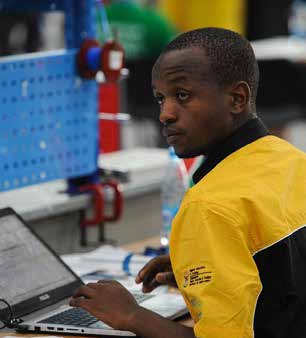 “With mechatronics, you can create your own design and manufacture something on your own,” Moleha said. Modise also a student of mechatronics at the Sedibeng Technical and Vocational Education and Training (TVET) College, said; “Mechatronics and other artisan trades give you the opportunity and skills to say, ‘I can start my own thing. I can be an employer. I can be anything’.”
“With mechatronics, you can create your own design and manufacture something on your own,” Moleha said. Modise also a student of mechatronics at the Sedibeng Technical and Vocational Education and Training (TVET) College, said; “Mechatronics and other artisan trades give you the opportunity and skills to say, ‘I can start my own thing. I can be an employer. I can be anything’.”
He explained that artisans can get a job and also do sideline work until they are ready to branch out on their own. Another positive aspects of becoming an artisan is that there is a shortage of artisan skills in the country, which means that graduates are more likely to find employment.
“TVET colleges are very important in developing artisans because students are exposed to the equipment that is used in companies while gaining practical experience,” said Modise.
Entrepreneur farmer uplifts others
Entrepreneur farmer uplifts others BathandwaMampe Mmeregi (60), the owner of Temaretha Agriculture Training School and Temaretha Piggery Farm in Gauteng, has trained several farmers in her community.
 The AgriSeta-accredited school trains farmers in Animal Production 1 and 2 and Plant Production 1, from Mmeregi’s 214-hectare farm. “Training started in 2015 and was accredited by the AgriSeta last year,” Mmeregi confirmed.
The AgriSeta-accredited school trains farmers in Animal Production 1 and 2 and Plant Production 1, from Mmeregi’s 214-hectare farm. “Training started in 2015 and was accredited by the AgriSeta last year,” Mmeregi confirmed.
The successful entrepreneur also runs a piggery, produces hay and vegetables and farms sheep, goats and cows. “I sell the pigs to Devon Meat Wholesalers and the sheep, goats and vegetables to members of the public,” she said.
This year, the farm also harvested 30 tons of maize, which it sells to agricultural services company AFGRI. “The farm is divided into two hectares for the piggery, 1.5 for the garden and 149 for the hay, and we have 160 hectares of arable land,” she said.
Mmeregi was this year’s winner of the Gauteng Female Entrepreneur Awards in the Top Entrepreneur: Commercial Farmer category. In 2013, she was the first runner-up in the Agri Business Woman of the Year competition, beating her position of second runner up in 2011.
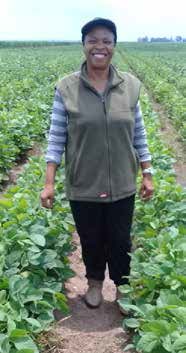 Mmeregi applied for her farm in 2008, through the Proactive Land Acquisition Strategy, and received it in 2009. In 2013, she was selected for the AFGRI Harvest Time Investment Farmer Development Programme and received assistance to develop the farm for five years. She said that the farm has since increased production, leading to the employment of 10 permanent staff members.
Mmeregi applied for her farm in 2008, through the Proactive Land Acquisition Strategy, and received it in 2009. In 2013, she was selected for the AFGRI Harvest Time Investment Farmer Development Programme and received assistance to develop the farm for five years. She said that the farm has since increased production, leading to the employment of 10 permanent staff members.
Mmeregi also received a grant from the Gauteng Economic Propeller, with which she used to buy equipment for her farm.
Female engineer flies high
Female engineer flies high tsoanaAn Ekurhuleni woman is pioneering a path for future avionics engineers to reach for the skies through a career in non-destructive testing inspection
Lefentse Phokwane (31) is the first and only woman to be appointed as an aircraft maintenance engineer specialising in non-destructive testing inspection at South African Airways (SAA) Technical.
SAA Technical is responsible for full-service maintenance, repair and overhaul of the airline’s aircraft.
Growing up in Vosloorus in Ekurhuleni, Phokwane aspired to become a chemical engineer but ended up studying for a Diploma in Non-Destructive Testing at the Vaal University of Technology (VUT).
“When I applied for admission at VUT, I was told there was no longer space for first-year students who wanted to enrol for chemical engineering. I was advised to register for non-destructive testing,” she said.
Phokwane initially knew nothing about this specialisation and despite being told that if someone dropped out, she could switch to chemical engineering, she had found her calling.
After obtaining her qualification, Phokwane applied for an apprenticeship at SAA Technical in 2009 and completed her trade test in 2012. She became an aircraft engineer in avionics.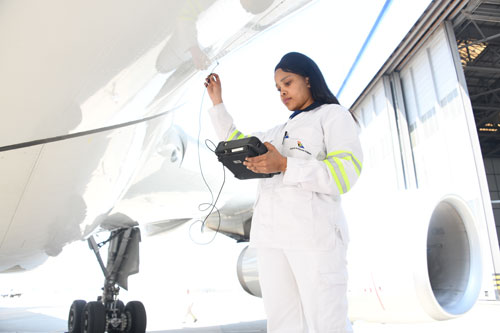
“I was then appointed as an aircraft maintenance engineer specialising in non-destructive testing inspection,” she said.
As part of her job, she performs detailed inspections on aircraft and aircraft components, using various specialised techniques of inspection to look for cracks and defects that are not visible to the naked eye but which could cause damage to or malfunction of the aircraft.
Like vehicles, an aircraft needs to be regularly serviced for it to function properly and to transport passengers safely.
“One of the most fulfilling rewards for me is to see an aircraft I have worked on take-off, defect-free, and know that my signature is there among the many talented, committed and passionate men and women who also worked on it,” she said.
“I cannot afford to miss any defects. I have to be at my optimum every day and remind myself that although I work with aircraft, people’s lives are what I have to keep in mind,” she added.
She has to develop herself constantly to stay on par with the rest of the engineers in her field because technology is always evolving.
One of the highlights of her career is recently attending training at Rolls-Royce, which is a British luxury car and aero-engine manufacturing business. The company has built a solid reputation for the development and manufacture of engines for defence and civil aircraft.
"According to their records, I am the third female in the world and the first one from Africa to receive this kind of training from their company. That is really humbling to know,” she said.
Phokwane has encouraged young people to consider this career path because non-destructive testing inspection is not as popular in South Africa as it is abroad, and that means there are job opportunities for qualified individuals.
She said the fact that she is still the only woman at SAA Technical doing this kind of work shows that graduates would be highly employable.
Opportunities for young people
According to SAA head of media relations Tlali Tlali, SAA Technical recruits and trains about 150 apprentices and 30 interns annually. "All nine provinces are allocated an appropriate number of recruits to ensure that youth from across the country get equal opportunities to become aircraft artisans," said Tlali. He also said the apprentices and interns get trained as aircraft mechanics and aircraft electricians, radiotricians, instrumentation experts, welders, trimmers, spray-painters and structure workers.
Tlali said SAA Technical advertises the internships internally, as well as through all Offices of the Premier and with different training institutions, such as technical and vocational education and training colleges.
The recruitment process for the next intake has closed and interviews are now being conducted, said Tlali
“The first 100 apprentices will start on 16 October, and a second batch of 50 on 16 March 2020. We will not advertise for the March 2020 intake as we have acquired enough CVs for both intakes,” said Tlali. He added that the 30 interns, who already hold a tertiary qualification, will start on 16 November 2019.
You can visit the Premier’s Office in your province to find out about the next application period for apprentices and interns.
GEC to grow artisanship in South Africa
GEC to grow artisanship in South Africa UrsulaThe General Education Certificate will facilitate the transition from school to college and also address the current problem of young people leaving education with no national qualification, to navigate the labour market.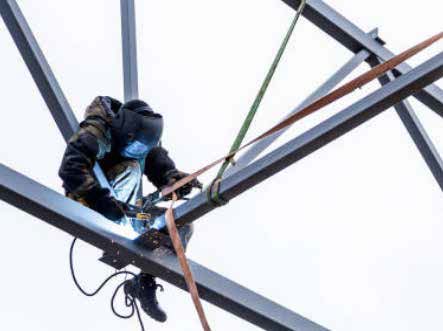
The move to introduce a General Education Certificate (GEC) at the end of Grade Nine could help with the development of artisans, according to the Department of Basic Education (DBE). "The Field Trial for the GEC at the end of Grade nine is scheduled for completion at the end of July 2020. A draft framework for the GEC has been developed. Assessment and examination modalities for the GEC are being investigated... The technical occupational subjects have been packaged and submitted to Umalusi for approval," said Basic Education Minister Angie Motshekga.
The department said GECs will assist pupils to access technical education at institutions such as technical and vocational education and training (TVET) colleges.
“The GEC certificate is predicated on the 3-Stream Model which has the academic pathway, the technical vocational pathway and the technical/occupational pathway. The plan aims to send more learners into technical education,” said department spokesperson Elijah Mhlanga.
He explained that new subjects are being piloted as part of a plan to equip pupils for TVET studies.
“The department has also introduced new subjects – technical mathematics and technical science – which could be referred to as applied mathematics and applied science,” he said.
They support areas of specialisation and schools that offer these subjects are currently being unveiled in different parts of the country, said Mhlanga.
He said GECs would contribute towards developing sustainable communities, provide a basis for learning in further education and training and establish a firm foundation for skills development that will prepare learners for the workplace.
“Under the technical vocational stream, there was a target of 10 000 artisans per year,” said Mhlanga.
The DBE recently came under heavy criticism from the general public following reports that it was planning to award school-leaving certificates to Grade Nine pupils.
Mhlanga said the plan, which sparked furious debate on social media, was nothing new and had, in fact, been mentioned in three speeches in the past. First, by President Cyril Ramaphosa at the Basic Education Lekgotla on 21 January, then in the President’s State of the Nation Address in February and, lastly, during the BDE’s Budget Vote on 17 June, he detailed.
Giving children a chance to sparkle
Giving children a chance to sparkle UrsulaA Hermanus couple’s success in improving education in a nearby township demonstrates just how much of a difference civic-minded people can make in the country.
In 2011, husband and wife Theo and Angie Krynauw who were residents of Hermanus, in the Western Cape, were concerned about the huge divide between the rich who were residing in Hermanus and the poor who were residents of Zwelihle, the neighbouring township.
The couple decided to do something about this divide and started the non-profit organisation, Sparklekids.
Their approach was to uplift the young people who were pupils of Qhayiya Secondary School in Zwelihle.
The couple was looking at ways to improve the school's performance.
They started the programme in order to improve the matric pass rate from 32 percent, the standard of teaching and facilities.
Theo and Angie were determined to help and set about raising money from donors and identifying teachers from Cape Town who could assist with improving the quality of education in Zwelihle.
“The teachers would come to assist over holidays and weekends. Every Monday, we would also go to the school to do an assembly, where we would try to motivate and inspire the children, letting them know that there is a way out of poverty,” Theo said.
With the assistance of donors, Sparklekids has since supported over 100 previously disadvantaged children from Zwelihle, helping them with their education and giving them opportunities to go to tertiary institutions after school.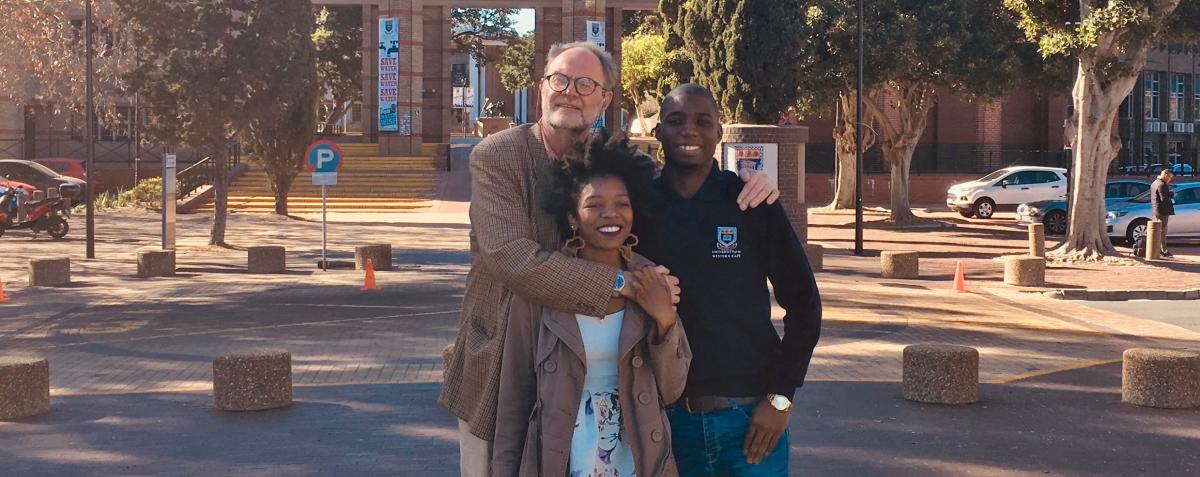
“We identify children who show a real willingness to learn and improve themselves,” explained Theo. These children are given after-school tutoring to help them improve their marks.
Today, the list of students supported by Sparklekids has grown to over 120. Many of these youth are now studying at university for degrees, with Sparklekids supporting them with registration fees, transport, toiletries and appliances.
“We started with two students – Lungisa and Anita. Today, Lungisa is a civil engineer and Anita is doing her second degree in chemical engineering. This just goes to show what a quality education can do for a young person,” Theo pointed out.
Two former Sparklekids are now teachers at Qhayiya Secondary School, where Theo and Angie still identify most of the children they support.
For more information about Sparklekids, contact Theo on 082 654 4924 or email theo.sparklekids@gmail.com
Good nutrition promotes overall health
Good nutrition promotes overall health JoyEating whole foods rather than ultra-processed ones is much better for your health.
Eating healthily to ensure good nutrition is a key component of a healthy lifestyle.
This is according to the National Department of Health, which said that healthy eating and regular exercise can help to achieve and maintain a healthy weight and reduce the risk of diseases such as diabetes, high blood pressure, heart disease and cancer.
The risk of contracting Non – Communicable Diseases (NCDs) starts in childhood and builds up throughout life.
NCDs include strokes, heart diseases, cancers, diabetes and chronic kidney disease
The concept of optimising nutrition in the first 1 000 days (from conception to two years old) is important to prevent over- and under-nutrition.
However, regularly eating mostly whole foods - which are low in added sugar, fat and salt and naturally higher in vitamins, minerals and fibre - can help to prevent unwanted weight gain, NCDs and death from these diseases.
The importance of whole foods
Whole foods have not been refined, have been processed as little as possible and are eaten in their natural state. They include unprocessed food, such as the edible parts of fruits and vegetables; and minimally processed food, such as oats, brown rice and legumes. Both should have no added salt, sugar, oils or fats.
While processed foods still resemble the original food item, they have been modified to the point where they no longer resemble the food from which they originate and contain very little or none of the original nutrients. They also typically consist of five or more ingredients such as sugar, oils, fats, salt, anti-oxidants and preservatives. Sugary drinks are a good example.
These ingredients make products taste better, but when consumed in large quantities they can cause an excessive intake of energy that can contribute to weight gain. High salt consumption is also associated with hypertension and cardiovascular diseases.
Save money
Food is expensive. The department has provided the following tips to help you cut costs, while still being able to prepare healthy meals:
- Look for store sales or specials.
- Check expiry dates and the quality of food you buy on sale.
- Ensure you have enough extra money and storage space to buy in bulk (but check that you will use the food before it expires).
- For better value, buy fruits and vegetables when they are in season.
- Dry products like maize meal, wheat flour, rice, pasta, couscous and frozen foods keep for a longer period and can be bought in bulk.
- Single portion items are often more expensive than buying in bulk.
- Buy fewer canned, prepared or ready-to-eat foods. They cost more and are often higher in sugar, salt and fat.
- Ready-to-eat bottled baby foods are costly. Use fresh foods and vegetables that can be pureed or mashed to the right consistency.
* Information courtesy of the National Department of Health.
How to start your own transport business
How to start your own transport business UrsulaOctober is National Transport Month and with the sector estimated to grow substantially over the next decade, it provides exciting career opportunities.
The Department of Transport (DoT) has estimated that demand for transport, especially freight transport, will grow in South Africa by between 200 and 250 percent over the next 15 years.
Vuk’uzenzele explores the opportunities available in the sector. These range from passenger transportation to the transport of goods. The DoT has released a handy booklet which identifies the opportunities and threats in the sector.
The booklet can be found on the DoT website.
Called Business Opportunities in the Transport Industry, the booklet covers the sub-sectors of taxi, road freight and bus in particular, as well as rail, air and maritime transport.
For taxis, the most promising opportunities range from pre-booked tours to catering, deliveries, passenger transport and the manufacture of vehicles.
In road freight, the department has identified the building of truck stops and the distribution of food, beverages, timber and general commodities as the most promising areas for small businesses.
In the bus sub-sector, scholar transport, joint ventures and maintenance present the most opportunities for entrepreneurs.
Starting your own transport business
Starting a transport or logistics business does not require vast sums of money. The industry has low barriers to entry, as anyone with a minibus or bakkie is able to start offering transport services. It is, however, essential that you do your homework first.
Many of the small transport businesses in South Africa do not have enough funding to stay sustainable in a very competitive industry and sometimes lack knowledge about marketing, licensing and business plans. To get this knowledge, it is advisable that you study a professional course such as the N3 National Certificate in Freight Handling offered at some Technical and Vocational Education and Training colleges.
It is also a good idea to join the Road Freight Association, which offers a number of support services to members.
Securing funding can sometimes be a challenge, but you should explore avenues such as the South African SME Fund or the Department of Trade and Industry (dti) in order to access grants. It is important to note that you need to have a solid business plan in place when approaching these organisations for assistance.
The booklet can be accessed at www.transport.gov.za. For copies of the booklet, contact the Department of Transport on 012 309 3172.
*For enquiries about starting a transport business, contact the dti at 0861 843 384.
Jobs: Department of Labour - Oct 2019
Jobs: Department of Labour - Oct 2019 angenithaDirector: NMW Research and Monitoring
Centre: Directorate: NMW Research and Monitoring
Reference No: HR 4/19/10/10HO
Salary: All inclusive: R 1 057 326 per annum
Enquiries: Mr. T Mkalipi, Tel: (012) 309 4123
Head Office: Chief Director: Human Resources Management, Private Bag X 117, Pretoria, 0001.
Director: NMW Policy BCEA and Administration
Centre: Directorate: NMW Policy and Administration
Reference No: HR 4/19/10/11HO
Salary: All inclusive: R 1 057 326 per annum
Enquiries: Mr. T Mkalipi, Tel: (012) 309 4123
Head Office: Chief Director: Human Resources Management, Private Bag X 117, Pretoria, 0001.
Deputy Director: Research and Data
Centre: Directorate: Research and Monitoring
Reference No: HR 4/19/10/13HO
Salary: All inclusive: R 869 007 per annum
Enquiries: Mr. T Mkalipi, Tel: (012) 309 4123
Head Office: Chief Director: Human Resources Management, Private Bag X 117, Pretoria, 0001.
Deputy Director: Monitoring and Evaluation
Centre: Directorate: Research and Monitoring
Reference No: HR 4/19/09/12HO
Salary: All inclusive: R 869 007 per annum
Enquiries: Mr. T Mkalipi, Tel: (012) 309 4123
Head Office: Chief Director: Human Resources Management, Private Bag X 117, Pretoria, 0001.
Assistant Director: NMW Policy BCEA and Administration
Centre: Directorate: NMW Policy, BCEA and Administration, Head Office
Reference No: HR 4/19/10/14HO
Salary: Commencing: R470 040 per annum
Enquiries: Mr. T Mkalipi, Tel: (012) 309 4122
Head Office: Chief Director: Human Resources Management, Private Bag X 117, Pretoria, 0001.
Deputy Director Labour Centre Operations
Centre: Labour Centre: Malelane
Reference No: HR 4/4/7/59
Salary: All inclusive: R 869 007 per annum
Enquiries: Ms. M Mazibuko, Tel: (013) 665 8701
Provincial Office: Chief Director: Provincial Operations, Private Bag X7263, Emalahleni, 1035
Deputy Director: Finance and Office Administration
Centre: Provincial Office: Gauteng
Reference No: HR 4/4/4/09/04
Salary: All inclusive: R733 257 per annum
Enquiries: Ms. KJ Ntshingane, Tel: (011) 853 0307
Provincial Office: Chief Director: Provincial Operations, PO Box 4560, Johannesburg, 2001
Assistant Director: COID-Statutory Services
Centre: Provincial Office: Mpumalanga
Reference No: HR 4/4/7/61
Salary: Commencing: R376 596.00 per annum
Enquiries: Ms NL Njwambe, Tel: (013) 655 8775
Provincial Office: Chief Director: Provincial Operations, Private Bag X7263, Emalahleni, 1035
Chief Executive Officer (Five (5) years fixed term contract)
Centre: Supported Employment Enterprise, Silverton Reference No: HR 4/19/10/20 HO
Salary: All inclusive: R 1 251 183 per annum Enquiries: DDG PES Mr. S Morotoba, Tel. (012) 309 4783
Head Office: Chief Director: Human Resources Management, Private Bag X 117, Pretoria, 0001.
Closing date for applications: 28 October 2019 | For full details of the advertised posts visit our website: www.labour.gov.za
Applications must be submitted on a Z83 form, obtainable from any Public Service Department or on the internet at www.gov.za/documents. The fully completed and signed form Z83( Section A and B Compulsory) should be accompanied by a recently updated, comprehensive CV as well as recently certified copies of all qualification(s), academic records including a Senior Certificate and ID-document [Driver’s license where applicable](Certified copy of a copy will not be accepted). The certification must be within three (3) months as at the advert closing date. Non-RSA Citizens/Permanent Resident Permit Holders must attach a copy of their Permanent Residence Permits to their applications. Should you be in possession of a foreign qualification, it must be accompanied by an evaluation certificate from the South African Qualification Authority (SAQA) including Matric. Applicants who do not comply with the above-mentioned requirements, as well as applications received late, will not be considered. The Department does not accept applications via fax or email. Failure to submit all the requested documents will result in the application not being considered. Correspondence will be limited to short-listed candidates only. If you have not been contacted within eight (8) weeks after the closing date of this advertisement, please accept that your application was unsuccessful. Suitable candidates will be subjected to a personnel suitability check (criminal record, citizenship, credit record checks, qualification verification and employment verification). Where applicable, candidates will be subjected to a skills/knowledge test. All shortlisted candidates for SMS posts will be subjected to a technical competency exercise that intends to test relevant technical elements of the job, the logistics of which be communicated by the Department. Following the interview and technical exercise, the selection panel will recommend candidates to attend generic managerial competencies using the mandated DPSA SMS competency assessment tools. Successful candidates will be appointed on a probation period of 12 months. The Department reserves the right not to make any appointment(s) to the above post. The successful candidate will be expected to sign a performance agreement. The Department of Labour is an equal opportunity affirmative action employer. The employment decision shall be informed by the Employment Equity Plan of the Department. It is the Department’s intention to promote equity (race, gender and disability) through the filling of this post(s) with a candidate whose transfer / promotion / appointment will promote representativity in line with the numerical targets as contained in our Employment Equity Plan.
Know the symptoms of substance abuse
Know the symptoms of substance abuse UrsulaIf your child is behaving differently, suddenly performing badly at school or things are going missing from your home, you need to consider the possibility that they may be abusing substances.
Although substance abuse is rife in South Africa, especially amongst the youth, parents and loved ones who take early action can prevent a catastrophe from happening.
According to the Western Cape Department of Social Development (DSD), the challenge for parents is to distinguish between the normal, sometimes volatile, ups and downs of the teen years and the red flags of substance abuse.
The department warned loved ones to be on the look-out for these signs of substance abuse:
- Suddenly being secretive about friends, possessions and activities
- Declining grades
- Missing money, valuables or prescriptions
- Acting uncharacteristically isolated, withdrawn or depressed
- Bloodshot eyes
- Changes in appetite or sleep patterns
- Sudden weight loss or weight gain, and
- Unusual smells on the breath, body or clothing.
In cases where a parent finds or suspects that their child is using drugs or any other substance, the South African National Council on Alcoholism and Drug Dependence (Sanca) advises parents to calmly address the issue with the child. Parents or caregivers must maintain an open and honest dialogue with their child and give a clear message that the use of drugs and alcohol is strictly forbidden.
As a means to limit their access to alcohol or drugs, Sanca advises parents to give children the bare minimum in pocket money.
The Western Cape DSD said parents seeking to address substance abuse must not make excuses or try to hide the problem. It’s natural to want to help a loved one in need but protecting them from the negative consequences of their choices may keep them from getting the help they need, cautions the department.
For more information on overcoming drug addiction, call Sanca on 011 892 3829 or logon to www.sancanational.info
Learning about epilepsy
Learning about epilepsy angenithaMisconceptions about epilepsy can be lessened if more people are taught about the condition and what to do when a person has a seizure.
One in every 100 South Africans is affected by epilepsy, according to Epilepsy South Africa.
Epilepsy, which is a neurological disorder characterised by recurrent seizures, is a chronic condition without a cure but can be controlled with medication and a healthy lifestyle.
Up to 80 percent of people with epilepsy will be able to control their seizures with medication.
Epilepsy South Africa estimates that up to five percent of the population will experience one seizure in their lifetime.
About 66 percent of epilepsy patients have what is called idiopathic epilepsy, in which the underlying causes are unknown.
In symptomatic epilepsy, the causes are generally known and can include a head injury, a birth injury such as the lack of oxygen during birth; alcohol and drug abuse; aging and metabolic or biochemical disturbances or imbalance.
Seizures may either be generalised – in which sufferers may lose consciousness, or partial – causing seizures but no lack of consciousness.
The main forms of seizures are generalised absence seizures – characterised by;
- Momentary blankness and slight twitching and often mistaken for daydreaming.
- Generalised tonic-clonic seizures – characterised by muscle stiffening and convulsions.
- Complex partial seizures – characterised by repetitive movements, such as plucking at their clothes, confusion and distraction.
How you can help
During an absence seizure, reassure the person, who may be unaware of the seizure. Note that a seizure occurred and what happened, including the duration. The seizure will be very short lived before normal brain activity continues.
Tonic-clonic seizures usually last a few minutes. Protect the person from injury by moving objects away and cushioning their head. Do not restrict their movement or put anything in their mouth. Lay the person on their side once the seizure ends.
When a complex partial seizures occurs, remove harmful objects and guide the person away from danger. Talk quietly to reassure him or her.
*Information courtesy of Epilepsy South Africa
To find out more about how to deal with epilepsy, call Epilepsy South Africa on 0860 EPILEPSY (374 537). Alternatively, email info@epilepsy.org.za or visit www.epilepsy.org.za.
Mental health treatment boosted in NC
Mental health treatment boosted in NC BathandwaA new R1.3 billion state-of-the-art hospital is already treating patients with mental health illnesses in Kimberly in the Northern Cape.
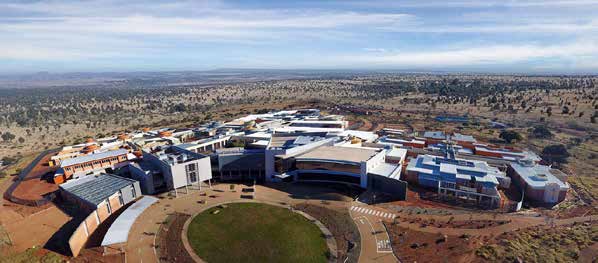 The Northern Cape Mental Health Hospital, which was recently opened by the province’s Premier Zamani Saul, offers a wide range of treatment including child and adolescent mental health services, forensic mental health services and general adult psychiatric services.
The Northern Cape Mental Health Hospital, which was recently opened by the province’s Premier Zamani Saul, offers a wide range of treatment including child and adolescent mental health services, forensic mental health services and general adult psychiatric services.
Premier Saul said the hospital will bring together mental health services in the province and relieve pressure on West End Hospital. “Psychiatric services in the Northern Cape were highly fragmented. They were provided at facilities in Bloemfontein and Cape Town.”
Kimberley’s West End Hospital was opened in 1991 to provide acute, chronic and outpatient psychiatric services. “Although this was a major step, it has since fallen short of the norms and standards set out in the new Mental Health Act and its legislative reforms,” the Premier said.
The new hospital is already open and 160 patients have been transferred from West End Hospital. Premier Saul said 20 more patients, in the forensic observation and child and adolescent mental health care units, will also receive treatment at the Northern Cape Mental Health Hospital. “The new hospital has a capacity of 287 beds, and will be operationalised in phases,” he added.
The Premier confirmed that during Mental Health Awareness Month, in October, the province will scale up the decentralising of integrated primary health services, including mental health care, in accordance with the National Mental Health Policy and Strategic Plan 2013 – 2020.
The province has also identified another 11 hospitals to refurbish and capacitate to accommodate mental health units.
NC soccer stars go national
NC soccer stars go national angenithaA women’s soccer team from the Northern Cape has made its way to the National Women’s League.
Richmond United Ladies Team from De Aar in the Northern Cape made history by becoming the first ladies soccer team in the province to participate in the South African Football Association’s National Women’s League (SNWL), after winning the provincial Sasol Women’s League.
The team was founded by Amichad Amsterdam in 2013 to get young women off the street, help them nurture their talent and professionalise their sporting careers.
“Richmond is one of the small towns in the province and most young people are unemployed. My vision for establishing a ladies soccer team was to get young women to independently make a living from their talent,” said Amsterdam.
In 2018, the team became the provincial champions and automatically qualified to play in the national league. Amsterdam said this milestone did not come easy.
He said one of the challenges facing the team is a lack of sponsorship, which affects operational matters and the team’s sustainability.
“In this day and age women should get more support when it comes to sports, because we see how they excel in different sporting codes. It is sad that even at national league level, women are still not receiving the same amount of support as men, in terms of sponsorships and salaries, among other things,” said Amsterdam.
Although the team is based in Richmond in Ubuntu, it nurtures talent from other municipal areas around the province and a few from the North West and Western Cape too.
Recently, the provincial Department of Sport, Arts and Culture provided the team with soccer gear and training equipment worth close to R250 000.
The captain of the team, Notolo Nongxusa, expressed appreciation for the new kit.
“This will inspire us to work a little harder and the equipment will assist us a lot during training sessions so that we can improve the way we exercise and hopefully develop new tactics on the ground,” said Nongxusa.
Panel beater beats the odds
Panel beater beats the odds UrsulaA passion for fixing cars has lead Makhele to run a growing business.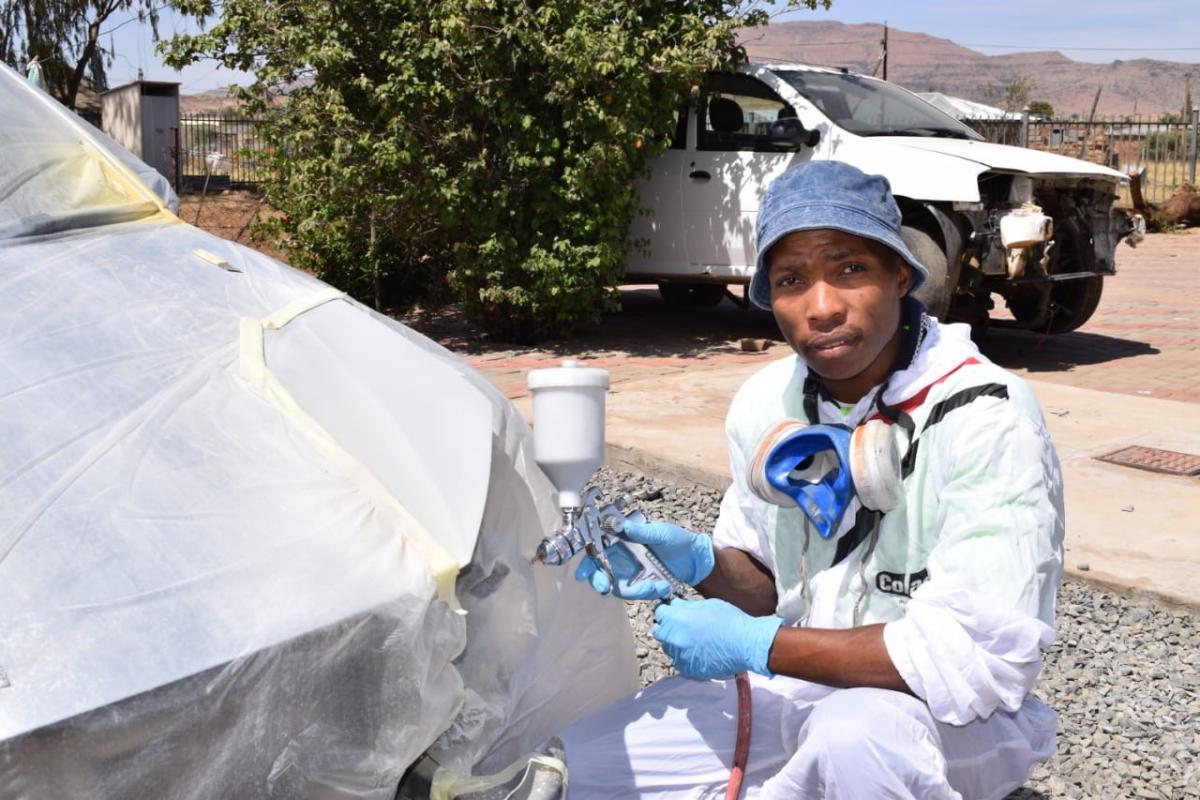
Despite a tough childhood, Senekal Makhele today owns his own panel beating and spray painting business in Thaba Nchu.
Proudly bearing Makhele’s nickname, Twaks Motor Body Works specialises in scratch removals, dent repairs, polishing and colour renewal, body panel replacement, body spray painting and panel beating.
The 26-year-old lost his mother early in life and although his sister cared for him initially, he was eventually taken in by a neighbour. Despite his tragedy, Makhele said he has always been surrounded by love.
When he was in Grade 11, Makhele had the opportunity to assist a local panel beater work on his family car after it was involved in an accident.
“He equipped me with panel beating and spray painting skills and I quickly fell in love with what I was doing,” he said.
Makhele always loved cars and as a child, and would craft toy cars from wire. Panel beating seemed a natural fit and he began working part-time for the panel beater, who Makhele said realised his passion and advised him to study towards a qualification in panel beating and spray painting.
Taking his employer’s advice, he completed a Level 3 panel beating and spray painting qualification at Motheo Technical and Vocational Education and Training College in Bloemfontein.
“My adoptive mother has always been supportive and paid for my tuition fees until I completed my artisan certificate,” he said.
Makhele gained experience working at backyard panel beaters and at formal businesses, before being offered an apprenticeship at Sovereign BMW in Bloemfontein.
After saving to buy his own equipment, he eventually took the plunge from employee to entrepreneur.
“Watching videos on how other panel beaters worked and how they managed to open their own businesses inspired me to consider starting a company. I also attended an entrepreneurial workshop that was organised by the National Youth Development Agency and a youth camp that was hosted by the provincial Department of Social Development, where I was further motivated by other young entrepreneurs whose businesses were doing well,” he said.
Twaks Motor Body Works was registered last year and after doing private jobs while completing his apprenticeship, Makhele already has a growing client base.
Participate in Census 2021’s Mini Test
Participate in Census 2021’s Mini Test tsoanaExpect a knock on your door from Statistics South Africa’s fieldworkers as they gather information ahead of Census 2021.
Statistician-General Risenga Maluleke is encouraging communities to participate in Statistics South Africa’s (Stats SA) Census 2021 Mini Test, to ensure that quality data for evidence-based policy-making is collected.
The Mini Test runs from 9 October to 6 November in selected areas around the country.
Fieldworkers have already started visiting households in Buffalo City, Ekurhuleni, Mangaung, UMgungundlovu, Polokwane, Emalahleni, Kimberley, Rustenburg and Cape Town.
“Data collected remains confidential and covers demographic variables such as age, sex, language spoken, migration, education, employment status and household living conditions, among others,” said Maluleke.
According to Stats SA, the Census Mini Test is being conducted to prepare for the upcoming Census in 2021. It will test and review census data collection tools, systems and operational methodologies.
Stats SA said Census 2021 will be the first population count to use new digital methods of data collection.
Fieldworkers will administer the census questionnaire face-to-face with respondents, using a computer-assisted personal interview. Where applicable, a computer-assisted web interview is available to complete the questionnaire online.
“Population censuses are the key source of data about the population and the socio-economic dynamics in the country. The data collected through a census is used by different sectors of society, including government, business and other users, for evidence-based planning and decision making,” Maluleke said.
Field operations officers completed training ahead of the Mini Test to prepare them to implement the new methodologies.
Given the continued development of new settlements in the country, Stats SA said updating the geography frame is one of the key activities that guide fieldwork operations to ensure that all dwelling units are identified and recorded.
“Fieldworkers assigned to update the geography frame are already working across the country to ensure that a comprehensive list is developed. They can be identified by their official Stats SA identification card, displaying the Stats SA logo, their photograph and a unique number,” said Stats SA.
Respondents can contact Census 2021’s toll-free number on 0800 110 248 or visit www.statssa.gov.za to verify fieldworkers visiting their homes.
Penguins ‘support’ Betty’s Bay locals
Penguins ‘support’ Betty’s Bay locals angenithaThe Stony Point penguin colony in the Western Cape village of Betty’s Bay is a popular tourist attraction.
It offers the public a chance to see penguins go about their daily activities in their natural habitat.
Along with protecting the endangered penguins, the site is proving to be a heart-warming example of how government officials can join hands with communities to create jobs and provide much-needed financial support. 
The Mooiuitsig community is located just outside the borders of the penguin colony. In 2007, the Mooiuitsig Community Trust was established to find ways for the members of this community to benefit from local tourism.
Provincial conservation agency CapeNature took over management of the penguin colony in 2014 and set about building a restaurant which was then handed over to the community.
Today, the On The Edge Restaurant employs six people from Mooiuitsig and profits are also given back to other community members.
Stakeholder Engagement Officer for CapeNature Edith Henn explained that the Mooiuitsig Trust is run by community members who have been provided with training.
“The members of the trust are given training sessions related to how a trust works, business management, administration, human resources, the importance of conserving Stony Point, fire awareness, water-saving tips and other topics,” she said.
This has allowed the elected trust members to greatly expand their knowledge and skills. Jordan van Wyk, chairperson of the trust, said the initiative has been a huge help not only to him, but the community as a whole.
“It gave me the chance to learn skills and to help serve my community. Now we are managing to employ people at the restaurant and other households in the community are also getting the rewards,” said Van Wyk.
Van Wyk said that every year, the trust hands out donations of R600 each to households.
Meanwhile, Lucretia Jordaan, the youngest elected trustee member, has enjoyed great personal growth as a result of being part of the initiative.
“I was studying business management but couldn’t afford to finish my studies. The trust gave me an opportunity to be the manager of the restaurant for three months,” said Jordaan.
Thanks to her involvement in conservation at Stony Point, she successfully got a job as a conservationist at the South African National Biodiversity Institute.
Protecting our oceans and creating jobs
Protecting our oceans and creating jobs tsoanaOne of government’s themes for October is Marine Month, which focuses on the importance of ocean resources.
South Africa has the Indian Ocean and the Atlantic ocean that are vital for food security, job creation and economic growth.
But in recent years, the world’s oceans have been under huge pressure from overfishing, pollution and climate change.
As a way of curbing this the government has been intensely focused on creating Marine Protected Areas (MPAs) – ocean areas where human activities are restricted in order to allow marine life to recover. More than 40 of these areas now exist around our coastline.
Apart from allowing for better fishing in areas close to the MPAs, these reserves have also opened up a wealth of job opportunities that benefit surrounding communities.
Many of South Africa’s MPAs and coastal nature reserves are in the Western Cape, where provincial conservation agency CapeNature is tasked with managing them.
“CapeNature focuses its efforts and those of its partners on creating jobs within the conservation field – for example coastal monitors, and within other fields of tourism,” said CapeNature spokesperson Loren Pavitt.
Much of these job creation efforts are driven through CapeNature’s People and Conservation Programme, which is aligned to the national Expanded Public Works Programme (EPWP).
“We are increasing community participation in the management and enjoyment of protected areas, using these areas for the sustainable harvesting of natural resources and restoring traditional values and systems while relieving pressure on natural resources,” Pavitt said.
In the past financial year, over 300 full-time equivalent jobs were created through the programme.
Coreen Coetzee is one of the programme beneficiaries at the Bird Island Nature Reserve in Lambert’s Bay. She has been given the opportunity to be a conservation assistant, which she said has changed her life.
“It enables me to provide for my children and their future. I would like to thank CapeNature and the EPWP for the opportunity to do my part for conservation,” said Coetzee.
Revitalising township economies
Revitalising township economies UrsulaWork is underway in KZN to transform townships into hubs of sustainable socio-economic development and empowerment.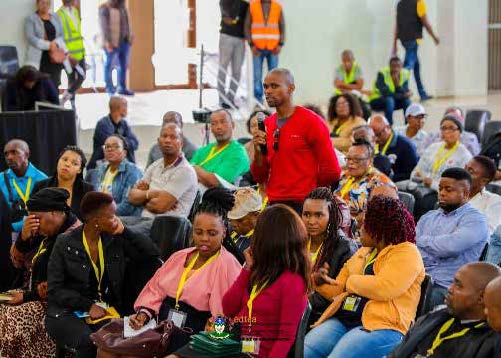
The KwaZulu-Natal (KZN) Department of Economic Development, Tourism and Environmental Affairs is running a campaign that aims to revitalise the economy in townships around the province.
The department recently launched its Business Revitalisation Programme, which is packed with workshops, training and support for local business people.
According to the Department of Economic Development, Tourism and Environmental Affairs spokesperson Nathi Olifant, women and youth-owned businesses will be prioritised for this programme. “We have over 10 townships in KZN whose economies have gone down due to a number of factors. To address this challenge, each township will have its own revitalisation campaign led by the department,” said Olifant.
He said revived and re-ignited township economies will enable residents to create jobs for themselves and uplift their communities.
To get the programme off the ground, the department hosted various local entrepreneurs in KwaMashu G Hall for the KwaMashu Business Revitalisation Programme.
“Like many other townships around the province, KwaMashu is occupying abandoned business spaces, buildings and facilities that could be better used to maximise new businesses in order to strengthen the local economy,” said Olifant.
He said the holistic programme will eventually benefit the entire province by allowing business people to better access and share information. It will be driven by the department and its 13 public entities.
“The plan is also to showcase available opportunities within the state and its organs and how businesses from the township can be assisted with skills and financial resources,” he explained.
How to participate in the programme
Olifant encouraged entrepreneurs who live in townships around KZN and who have registered their businesses, co-operatives or companies, to liaise with the department for funding and upskilling assistance.
According to Olifant, there are a number of state entities that offer funding and loans, but the department itself does not offer an over-the-counter funding service.
For enquiries regarding this programme, entrepreneurs can contact the department on 033 364 2500 or send an email to info@kznedtea.gov.za.
Social development’s role in fighting GBV
Social development’s role in fighting GBV tsoanaGender-based Violence
The role played by the Department of Social Development in helping to create a better South Africa is bigger than the provision of social grants and food parcels to vulnerable citizens.
This is according to the Minister of Social Development, Lindiwe Zulu, the department also has a role to play in addressing Gender-Based Violence and Femicide (GBVF).
“I am of the view that the nation needs to take a step back and deal with this problem individual by individual, family by family, house by house, and street by street… We need to go down to the basics. Violence is sitting somewhere in the homes in person-to-person relationships and to get to that level of relationships, you need to use other methods besides marching – although protests have their own impact,” the Minister said.
basics. Violence is sitting somewhere in the homes in person-to-person relationships and to get to that level of relationships, you need to use other methods besides marching – although protests have their own impact,” the Minister said.
Minister Zulu said community leaders must play a bigger role in getting residents to actively deal with the social ills affecting them.
“When church leaders and other community leaders speak to their fellow members about issues they grapple with on a daily basis, they speak from first-hand experience,” she said.
It is through dialogue and public engagements that solutions to this crisis can be found, she believes.
Tackling other social ills
The Minister also believes that the country needs more social workers to address pressing social ills, such as alcohol and drug abuse among the youth. Substance abuse itself is a contributing factor to South Africa’s high levels of GBVF, she said.
Minister Zulu said she recently signed off on the National Drug Master Plan that will shortly be presented to Cabinet. Once it reaches implementation phase, the Minister said she will insist on an inter-governmental and co-ordinated approach.
“Justice and Correctional Services, police, intelligence and others have to play their role because the biggest issue is to catch the masters who are manufacturing these drugs,” she said.
Minister Zulu said social workers play a huge role in providing counselling and support to drug abusers or addicts who need rehabilitation.
“If we do not address issues like alcohol and drug abuse, we will fail in our efforts to deal with other social ills in our communities,” she said.
South Africa’s future lies in Africa
South Africa’s future lies in Africa tsoanaUnion Buildings
I recently had the honour to host President Muhammadu Buhari of Nigeria on a state visit. Some people had thought that the visit would be tense and difficult following the attacks last month on foreign nationals living in South Africa, and the angry reaction to these events in Nigeria and some other African countries.
It turned out, as I had expected, to be an extremely successful visit, where we not only cemented the relations between our two countries but found that we are of one mind on how, as the two largest economies in Africa, South Africa and Nigeria can together play a key role in the future of the African continent. President Buhari and I both firmly believe that the prosperity and stability of our two nations – and all other countries on the continent – requires that South Africa and Nigeria have strong relations at an economic, trade, social, political, diplomatic and people-to-people level. This will result in a much more integrated and more cohesive Africa.
South Africa’s future lies in Africa. It is through our trade with the rest of the continent that we will grow our industries. The African marketplace is where our companies will increasingly find trading and investment opportunities. It is expected that over the next few decades there will be a massive increase in investment in infrastructure across Africa, which should benefit South African construction companies, manufacturers and banks.
The economies of the African continent are together growing at a rate far greater than our own, and we need to see the opportunity that such growth presents for our economy and for our people. It i s for this reason that we have embraced the African Continental Free Trade Area.
s for this reason that we have embraced the African Continental Free Trade Area.
The AfCFTA will be a game-changer, both for South Africa and the rest of the continent. With our relatively established manufacturing base, our developed road, rail, port and energy infrastructure, and our deep financial markets, South Africa is well-placed to make use of the opportunities a free trade area could provide.
The recent public violence targeting foreign nationals has challenged our efforts to build stronger ties with other African countries. Fueled by misinformation spread on social media, these attacks provoked much anger in different parts of the continent leading to threats against South African businesses and diplomatic missions.
I therefore welcomed the valuable and constructive discussion with President Buhari on this issue. We were both clear in our condemnation of attacks against foreign nationals in South Africa, as well as reprisal actions against South African interests in Nigeria. We emphasised the need for South Africans in Nigeria and Nigerians in South Africa to respect and obey the laws of their host countries. Importantly, we agreed to set up an ‘early warning mechanism’ through which our two countries can share information, coordinate efforts and act to prevent any recurrence.
Nigeria and South Africa are important for each other’s economies. More than 100 South African companies have investments in Nigeria and over 1 700 have active trade relations in the country. Trade between the two countries was worth around R50 billion last year, with South Africa importing a significant amount of its fuel from Nigeria. For its part, South Africa exports a wide range of products to Nigeria, including machinery and appliances, minerals and chemical products.
President Buhari and I had an opportunity also to discuss the various difficulties that South African and Nigerian businesses encounter when trying to invest and operate in each other’s countries. There was a clear message from the business forum that was held on the sidelines of the state visit that there is a great deal of business interest in both South Africa and Nigeria, and that we need to work harder to clear the blockages. We have therefore set up a Joint Ministerial Advisory Council on Industry, Trade and Investment that will meet regularly to facilitate bilateral business and, where necessary, sort out problems.
In just a few months, South Africa will be taking over chairship of the African Union. In that role, we will have a great responsibility to guide the implementation of the agreement on the Continental Free Trade Area. We will need to work to turn aspirations into action.
As the countries of Africa, we will need to put in place all the rules, regulations and mechanisms needed to make such a free trade area work. But we will also need to invest in the infrastructure that we need to move goods from one African country to another, and that we need to produce such goods in the first place. While we are undertaking a massive investment drive in South Africa, we are also encouraging investment in other parts of the continent. We do so in pursuit of the shared African vision of Agenda 2063, but also because we know that South Africa cannot prosper unless Africa as a whole prospers. South African companies already have an established presence in many other parts of the continent. Now is the time for a surge of South African investment in other markets on the continent. There are huge opportunities for expansion and development that our companies should be exploring.
The time is right for a new era of intra-African trade, where African countries no longer look abroad for the products and services they need, but to other countries on this continent. In so doing, they will be helping to establish new African industries, create African jobs, open up new markets and steadily turn Africa into a powerhouse of global production.
Our commitment to developing Africa through greater integration is not merely sentimental or ideological. It has already, and will in time to come, bring very real material benefits for this country. African integration is overwhelmingly and undeniably in our national interest. Our future is in Africa, with Africa.
Steps to end corruption in the health sector
Steps to end corruption in the health sector UrsulaThe new multi-disciplinary Health Sector Anti-Corruption Forum will prevent, detect, and prosecute fraud and corruption in the public and private health sectors.
Launched by President Cyril Ramaphosa in Pretoria on 1 October, the forum brings together civil society, health sector role players and government entities. These are the Department of Health, Council for Medical Schemes, the Financial Intelligence Centre, National Prosecuting Authority (NPA), Special Investigations Unit (SIU), Health Professions Council of South Africa, Board of Healthcare Funders, Health Funders Association, Section 27 and Corruption Watch.
The forum is an outcome of the Presidential Health Summit held last year in which corruption was identified as one of the biggest issues in the sector.
President Ramaphosa said the forum will allow people to report the misuse of state resources, such as ambulances, and issues related to procurement corruption.
He said the victims of corruption in the healthcare system are the most impoverished in our society. Corruption in this sector, he said, not only violates people’s constitutional rights but, in some cases, even costs lives.
The SIU will investigate allegations of corruption that are brought forward.
Head of the SIU Advocate Andy Mothibi said his organisation has identified the registration and accreditation of health professionals as an area where corruption is most rampant.
He said they have already started their investigations and will work towards recovering funds lost to corruption.
The NPA’s National Director of Public Prosecutions, Shamila Batohi, said they will prioritise cases of corruption referred to it by the SIU. “The forum was established so that we can fight rampant corruption in the health sector,” Batohi said.
She said for the forum to succeed, there must be enhanced collaboration between all role players.
Meanwhile, Minister of Health, Dr Zweli Mkhize said the forum will protect the National Health Insurance from corruption.
To report corruption, can call the Presidential Hotline on 17737 or the Anti-Corruption Hotline on 0800 701 701.
Two more STEM schools for Gauteng
Two more STEM schools for Gauteng BathandwaSt Barnabas College and UJ Metropolitan Academy, both specialising in science, technology, engineering and maths (STEM), will enable 197 Grade 8 pupils to learn various ICT skills, such as robotics and coding.
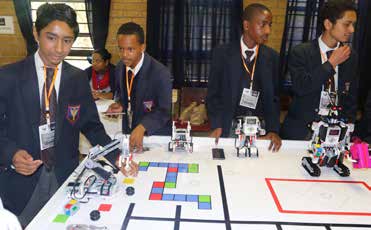 The schools were officially launched by Gauteng MEC for Education Panyaza Lesufi. The department is in partnership with Honeywell and its charity arm, Melisizwe Computer Lab Project, to equip pupils with software programming and ICT skills.
The schools were officially launched by Gauteng MEC for Education Panyaza Lesufi. The department is in partnership with Honeywell and its charity arm, Melisizwe Computer Lab Project, to equip pupils with software programming and ICT skills.
The conversion of the schools into specialisation schools is part of a wider initiative to drive participation among learners in STEM.
The Principal of St Barnabas College, Heather Carolus, said the school used to focus on maths and science, but has added ICT-related subjects to its curriculum. “The subjects will prepare learners for our society and a future society by empowering them for the next generation in coding and robotics,” she said.
The introduction of ICT subjects at the school has garnered great interest from pupils and classes will be phased in over a number of years, starting with this year’s Grade 8s, said Carolus. Besides a matric certificate, pupils will also earn certificates as they progress in their ICT studies.
“With the Fourth Industrial Revolution, we are starting to move with the times, so taking advantage of technology will really advantage pupils. If the children are not prepared then they will leave school without the needed skills,” said Lauren Edwards, a member of the school’s Governing Body.
“Through these partnerships and the initiatives with Honeywell, Melisizwe and the University of Johannesburg, we are igniting a new level of hunger for learning about STEM and committing to helping learners progress successfully through school. This will provide learners with opportunities to build exciting technology and science-focused careers, making a positive impact in our country and the world,” said MEC Lesufi.
“By investing in courses such as the Melisizwe Computer Lab Project, we are ensuring that young people in South Africa have the best possible start to their future technology careers so that they too can go on to help shape the way the world works through innovation,” said Honeywell’s President of Africa, Sean Smith.

